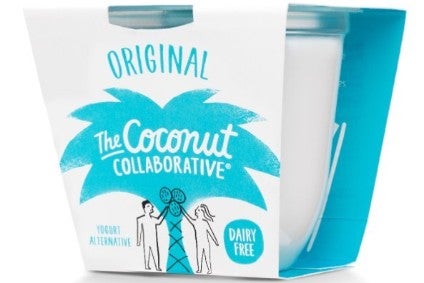
The Coconut Collaborative is to start manufacturing in the US, a fledgling market the UK dairy-free firm has identified as central to its growth plans.
The London-based company entered the US in 2017 and, after achieving initial listings with US grocer Wegmans, opened an office in Los Angeles last year.

Discover B2B Marketing That Performs
Combine business intelligence and editorial excellence to reach engaged professionals across 36 leading media platforms.
The firm is set to start manufacturing through an unnamed partner in the city, which will focus on producing the company’s yogurt alternatives that are sold locally. The desserts the company distributes in the US will continue to be shipped from Europe.
“We’re right at the start of our journey in America,” James Averdieck, the founder of The Coconut Collaborative, told just-food. “Our business in the US is initially going to concentrate in the north east and the south west. The shelf velocities where we’re selling is good.”
Averdieck, who set up Gü in 2003 before selling the UK desserts business seven years later, described the US and the UK as two “focus” markets for The Coconut Collaborative, which generated a turnover of more than GBP10m (US$12.9m) in 2018.
In the UK, Averdieck said the firm’s “big challenge” is increasing its share of the growing sales in the country of plant-based yogurts and desserts, a category led by Danone’s Alpro.

US Tariffs are shifting - will you react or anticipate?
Don’t let policy changes catch you off guard. Stay proactive with real-time data and expert analysis.
By GlobalDataIn recent quarters, The Coconut Collaborative has worked to become “much more competitive”, through work on pricing, range and distribution. The company, which had focused on coconut-based products, has added almond lines to its range in the UK and has plans to roll out oat-based SKUs later this year, both domestically and in the US.
“The big opportunity for us in the UK is to close an enormous gap with Alpro,” Averdieck explained. “If you like, Alpro had this market all to themselves and they really need a challenger.
“What we’ve been doing is becoming much more competitive. We’ve been moving people from more expensive single packs into more competitively-priced big pots. The price premium has come right down. It’s still significant because Alpro products are soy-based, soy is quite cheap… and they’ve got some very deep pockets behind them.
“Supermarkets like challengers and we’re really going for it. We’re working hard on the products to make them as competitively-priced as possible.”
Averdieck said The Coconut Collaborative accounts for “around 10%” of the sales of plant-based yogurts and desserts in the UK and added: “I want to get to 20% market share. The market’s growing anyway.”
The Coconut Collaborative has also built a presence in Europe, including in France and Germany, two markets Averdieck said accounts for “about 20%” of the company’s sales.
In the UK, The Coconut Collaborative has secured listings with all of the country’s four big supermarket chains. In Europe, the firm plans to “focus on more premium retailers, like Monoprix”, Averdieck said. “We’re not going on such a mass-market strategy because you can’t win everywhere.”
With Brexit on the horizon, Averdieck said he wanted to manufacture more of The Coconut Collaborative’s products in the UK.
“Maybe that’s the positive thing about Brexit if there are any positive things. Certainly, we’re going to be bringing more back into the UK,” he said. “Even if there was a no deal, I’m sure it would get sorted quite quickly. We’re talking about a period of disruption and then, eventually, of course, we’re going to have a free-trade deal.”



